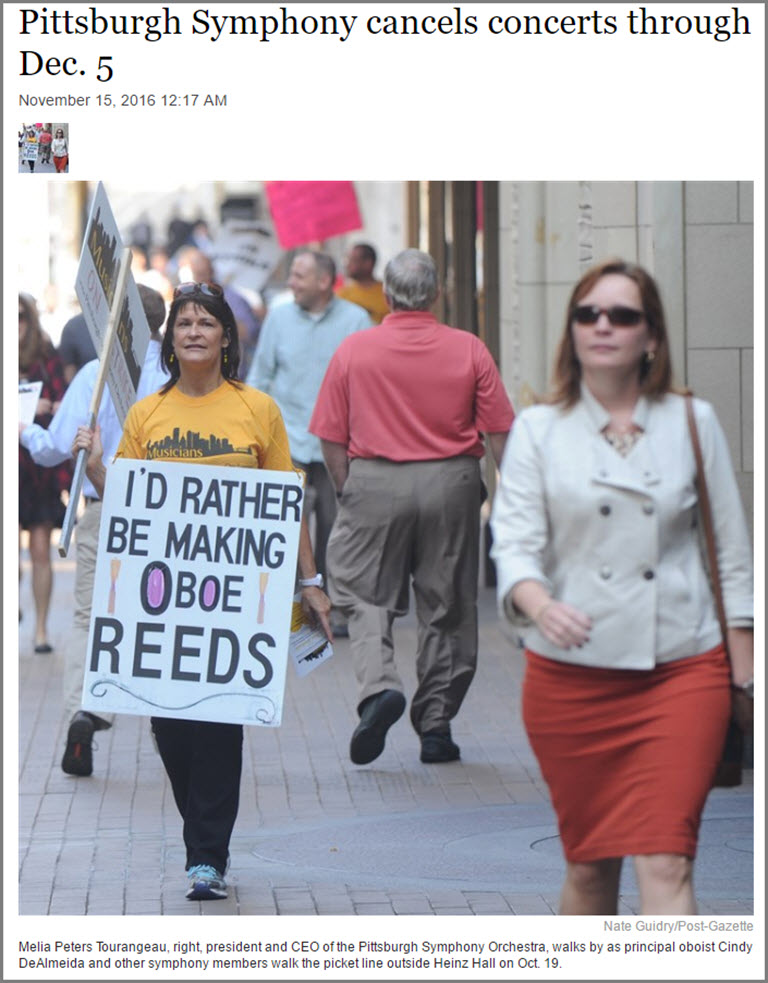There’s an interesting article by Elizabeth Bloom in the 3/15/2015 edition of the Pittsburgh Post-Gazette that reports on audience development woes at the Pittsburgh Symphony Orchestra (PSO). In a nutshell, the PSO’s $100,000 study produced results that aren’t exactly earth shattering and the tiny focus groups of non-ticket buyers incorporated an equally myopic cross section of individuals; according to Bloom’s article, only 45 people were involved, all participants were ages 40 to 64, had incomes of at least $75,000, and most were married and white.
 If you’ve read the Knight Foundation’s Magic of Music Final Report: The Search for Shining Eyes report* you’ll find it a far more useful resource than the conclusions reached in the PSO’s study. Nonetheless, some of the interesting bits of data from the PSO study include:
If you’ve read the Knight Foundation’s Magic of Music Final Report: The Search for Shining Eyes report* you’ll find it a far more useful resource than the conclusions reached in the PSO’s study. Nonetheless, some of the interesting bits of data from the PSO study include:
- The orchestra papers approximately 12 percent of the hall for an average classical series event.
- The average classical series event only generates revenue from 57 percent of its available seats.
- On average, classical series events generate a 69 percent attendance rate.
- The orchestra has been missing ticket revenue goals to the tune of 20 percent per classical series concert.
- Most of the PSO’s ticket revenue from classical series events, 68 percent, comes in via old school subscriptions.
On that last point, it is worth noting that nowhere in the article is there an examination related to how the PSO facilitates purchasing tickets. The article does include some input from PSO senior vice president and chief operating officer Michael Bielski, who acknowledged that subscriptions are increasingly difficult to sell.
The orchestra still relies on subscribers for most of its ticket sales — 68 percent of revenue in the classical series this season — and has probably fared better than most orchestras at retaining those committed audience members, Mr. Bielski said. With improved sales of group and single tickets ($25.75-$105.75), revenue has been stable, he said.
Still, modern audiences are less inclined to buy large ticket packages. It’s not a new problem — “I remember 20 years ago having conversations about how to increase subscribers,” he said — but the model may not be sustainable in the future.
“At some point,” he said, “you simply have to get more bodies in seats to earn money.”
Consequently, I reached out to the PSO to learn more about the study and whether or not it included an examination of the PSO’s box office capacity; specifically, whether or not they have the ability to sell tickets the way we examined in an article here from 1/30/2015 titled To Subscribe, Or Not To Subscribe, That Is NOT The Question.
At the time this article was written, the PSO had not replied but I contacted them very late in the day; so much so that it would be unrealistic to expect a response to such a specific set of questions in such a short period of time. As such, we’ll follow up on this point in another post when/if they reply.
In the meantime, make sure you read some of the reader comments to Bloom’s article and you’ll notice that one of the factors keeping some new ticket buyers away are the existing ticket buyers. On that point, Chattanooga Symphony & Opera concertmaster Holly Mulcahy published an entertaining piece of satire on that very topic on 2/2/2009 via her blog, Neo Classical; titled How To Alienate Your Audience in 10 Easy Steps: Audiences, make sure you don’t skip over Step #6 then give the Post-Gazette comment from Katie Carson a read.



Maybe the only way forward is pops concerts, and young audiences. Musicians right now are capable of so much. Experts at preparation, investing in the best instruments and teachers. They are standing on the shoulders of the Horowitzes and Heifetzes, and if all we have at the end of the day are concerts of movie soundtracks – maybe we deserved to fail.
The older audiences should also be actively encouraged to come. We’re caught up on the first time someone hears something. First of all, classical music is very difficult to fully appreciate on the first listen. Some audience members have collected all the records, they have heard all the greats, and now they are hearing it for the last time – so it better be special. Every concert must be played that way – and that audience should be celebrated.
On a somewhat related topic – the media is a force all its own – occasionally trying to craft what it thinks the classical music scene should be – and anything beyond that is sometimes given words like elitist, snobby, arrogant, or expensive. But it really comes down to this: if the public doesn’t try to find what they artistically like, they can’t hope to become better individuals. If they do try, they probably will.